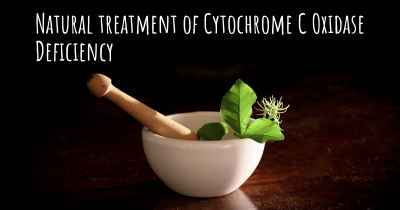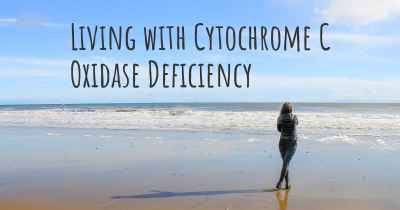Is it advisable to do exercise when affected by Cytochrome C Oxidase Deficiency? Which activities would you suggest and how intense should they be?
See if it is advisable for people with Cytochrome C Oxidase Deficiency to practice sports and which ones are the most recommended if you have Cytochrome C Oxidase Deficiency

When affected by Cytochrome C Oxidase Deficiency, it is important to approach exercise with caution and consult with a healthcare professional. Cytochrome C Oxidase Deficiency, also known as COX deficiency, is a rare genetic disorder that affects the function of mitochondria, the powerhouses of our cells. This deficiency can lead to muscle weakness, fatigue, and exercise intolerance.
While exercise can have numerous benefits for overall health and well-being, individuals with Cytochrome C Oxidase Deficiency may need to modify their exercise routine to accommodate their condition. The intensity and type of exercise should be tailored to the individual's specific symptoms and limitations.
Low-impact exercises are generally recommended for individuals with Cytochrome C Oxidase Deficiency. These exercises are gentle on the joints and muscles, reducing the risk of injury and excessive fatigue. Examples of low-impact exercises include:
- Walking: A brisk walk can help improve cardiovascular fitness without putting excessive strain on the muscles.
- Swimming: Water provides buoyancy, making swimming a low-impact and full-body workout.
- Cycling: Riding a stationary bike or cycling outdoors can be a great way to improve cardiovascular health while minimizing stress on the muscles.
- Yoga or Pilates: These activities focus on flexibility, balance, and core strength, which can be beneficial for individuals with muscle weakness.
Interval training may also be considered for individuals with Cytochrome C Oxidase Deficiency. This involves alternating between periods of higher intensity exercise and periods of rest or lower intensity. Interval training can help improve cardiovascular fitness while allowing for adequate recovery time.
It is crucial to listen to your body and not push beyond your limits. Overexertion can lead to increased fatigue and muscle weakness in individuals with Cytochrome C Oxidase Deficiency. It is recommended to start with shorter durations and lower intensities, gradually increasing as tolerated.
Additionally, it is important to pay attention to other factors that can impact exercise tolerance, such as nutrition and hydration. A well-balanced diet, including adequate protein and carbohydrates, can provide the necessary fuel for physical activity. Staying hydrated before, during, and after exercise is also essential.
Regular monitoring of symptoms and exercise tolerance is crucial for individuals with Cytochrome C Oxidase Deficiency. Working closely with a healthcare professional, such as a geneticist or a physiotherapist, can help develop a personalized exercise plan that takes into account the individual's specific needs and limitations.
In conclusion, exercise can be beneficial for individuals with Cytochrome C Oxidase Deficiency, but it should be approached with caution and tailored to the individual's symptoms and limitations. Low-impact exercises, interval training, and regular monitoring of symptoms are important considerations. Always consult with a healthcare professional before starting or modifying an exercise routine.








